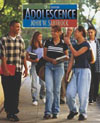John W. Santrock,
University of Texas, Dallas
| anabolic steroids | Drugs derived from the male sex hormone, testosterone. They promote muscle growth and lean body mass.
|
 |
 |
 |
| anorexia nervosa | An eating disorder that involves the relentless pursuit of thinness through starvation.
|
 |
 |
 |
| bulimia nervosa | In this eating disorder, the individual consistently follows a binge-and-purge eating pattern.
|
 |
 |
 |
| conduct disorder | The psychiatric diagnostic category for the occurrence of multiple delinquent activities over a 6-month period. These behaviors include truancy, running away, fire setting, and cruelty to animals, breaking and entering, and excessive fighting.
|
 |
 |
 |
| depressants | Drugs that slow the central nervous system, bodily functions, and behavior.
|
 |
 |
 |
| developmental psychopathology | Focuses on describing and exploring the developmental pathways of problems and disorders.
|
 |
 |
 |
| externalizing problems | Occur when individuals turn problems outward. Such as juvenile delinquency.
|
 |
 |
 |
| hallucinogens | Drugs that alter an individual's perceptual experiences and produce hallucinations-also called psychedelic or mind-altering drugs.
|
 |
 |
 |
| index offenses | Whether they are committed by juveniles or adults, these are criminal acts, such as robbery, rape, and homicide.
|
 |
 |
 |
| internalizing problems | Occur when individuals turn problems inward. Anxiety and depression.
|
 |
 |
 |
| juvenile delinquency | A broad range of child and adolescent behaviors, including socially unacceptable behavior, status offenses, and criminal acts.
|
 |
 |
 |
| major depressive disorder | The diagnosis when an individual experiences a major depressive episode and depressed characteristics, such as lethargy and depression, for two weeks or longer and daily functioning becomes impaired.
|
 |
 |
 |
| physical dependence | The physical need for a drug that is accompanied by unpleasant withdrawal symptoms when the drug is discontinued.
|
 |
 |
 |
| psychological dependence | The strong desire and craving to repeat the use of a drug for various emotional reasons, such as a feeling of well-being and reduction of distress.
|
 |
 |
 |
| status offenses | Performed by youths under a specified age, these are juvenile offenses that are not as serious as index offenses. These offenses may include such acts as drinking under age, truancy, and sexual promiscuity.
|
 |
 |
 |
| stimulants | Drugs that increase the activity of the central nervous system.
|
 |
 |
 |
| tolerance | A greater amount of a drug is needed to produce the same effect.
|



 2003 McGraw-Hill Higher Education
2003 McGraw-Hill Higher Education

 2003 McGraw-Hill Higher Education
2003 McGraw-Hill Higher Education